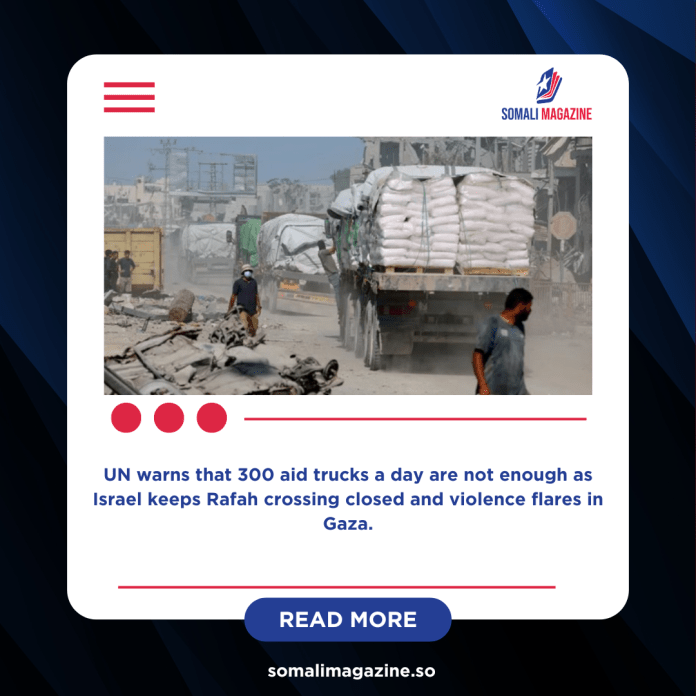Facebook Twitter (X) Instagram Somali Magazine - People's Magazine
Israel has imposed new restrictions on humanitarian aid entering the Gaza Strip, reducing the number of daily aid trucks and keeping the Rafah crossing closed, even as violence and tension rise despite a fragile ceasefire.
The United Nations said on Tuesday that Israel informed them it will now allow only 300 aid trucks into Gaza each day—half the number previously agreed upon. Olga Cherevko, a spokesperson for the UN Office for the Coordination of Humanitarian Affairs (OCHA), confirmed that the UN had received official notice from the Israeli military’s Coordination of Government Activities in the Territories (COGAT). The message stated that no fuel or gas would be allowed into Gaza except for essential humanitarian purposes.
Al Jazeera’s correspondent in Gaza City, Hani Mahmoud, said the aid reduction would make little difference in easing the suffering of Gaza’s people. “Three hundred is not enough. It’s not going to change anything,” he said. Israeli authorities also announced that the Rafah border crossing with Egypt will remain closed until further notice, further complicating the flow of much-needed assistance.
The restrictions were announced just hours after Israeli forces killed at least nine Palestinians in separate attacks across Gaza. Medical sources reported that six people were killed in Gaza City and three others in Khan Younis. Staff at al-Ahli Arab Hospital said Israeli soldiers killed five Palestinians in the Shujayea neighborhood. The Israeli military said it fired after identifying a threat from individuals approaching its forces in northern Gaza.
These attacks come only days after a ceasefire between Israel and Hamas began, part of a plan backed by US President Donald Trump aimed at ending the war that has devastated Gaza since October 2023. According to Palestinian health authorities, the conflict has killed more than 67,900 people and injured over 170,000, with thousands more believed to be buried under rubble. In Israel, at least 1,139 people were killed and over 200 taken hostage during Hamas’s assault on October 7, 2023.
As part of the ceasefire terms, Israel and Hamas exchanged captives on Monday. Nearly 2,000 Palestinians were released from Israeli prisons, while Hamas freed 20 Israeli captives. Another 154 prisoners were sent into exile in Egypt. Hamas had also agreed to return the bodies of 28 deceased Israeli captives but initially handed over only four. On Tuesday, the group transferred four more remains to the Red Cross, which later delivered them to Israel for identification.
Israel accused Hamas of violating the ceasefire agreement over the delay in returning all the bodies. President Trump reacted strongly to the delay on his Truth Social platform, declaring, “THE DEAD HAVE NOT BEEN RETURNED, AS PROMISED! Phase Two begins right NOW!!!” Hamas responded that recovering all the bodies would take more time due to the scale of destruction in Gaza and the difficulty of locating remains under collapsed buildings.
At the United Nations headquarters, Al Jazeera’s Gabriel Elizondo reported that Israel’s new restrictions appeared linked to frustrations over the slow return of deceased captives’ remains. Meanwhile, UN agencies and humanitarian groups renewed urgent calls for more aid to enter Gaza.
Jens Laerke, a spokesman for OCHA, said there are 190,000 metric tonnes of aid ready to enter the enclave but stuck at crossings. UNICEF spokesperson Ricardo Pires said the organization has 1,370 trucks waiting, noting that at least 600 trucks a day are needed to meet Gaza’s humanitarian needs. The World Health Organization (WHO) also urged for immediate delivery of medical supplies, warning that hospitals in Gaza are still overwhelmed. “We need to bring as many supplies as we can right now,” said WHO’s Tarik Jasarevic. “Health workers cannot do their jobs without the basic equipment and medicine they need.”
Observers warn that the standoff could further erode public confidence in both the government and opposition, especially if violence escalates. For now, residents of the capital are caught between rival political camps—one calling for public mobilization, the other threatening strict measures against dissent. How the situation unfolds in the coming days may determine whether Mogadishu sees another round of unrest or manages to pull back from the brink.

